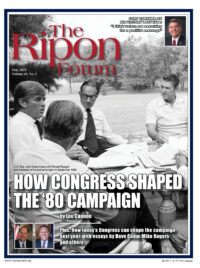
There’s a quiet debate going on in Washington over the role Republicans in Congress should play in the 2016 presidential election. It goes something like this. One side argues that Hill Republicans should leave a faint legislative footprint so as not to risk running afoul of the eventual GOP presidential nominee’s agenda. Better to be cautious in 2015 rather than stuck in an internal party conflict a year from now.
The other side, of which I am a proponent, argues that if Hill Republicans can keep the focus on jobs and the economy through legislative and policy initiatives, especially in these crucial months before the GOP presidential nominee is chosen, the party has a huge opportunity to expand its majority coalition for the foreseeable future. And that kind of positive environment is good for the nominee whoever he or she may be.
Moreover, if Republicans take a reactive approach, they do little more than give Hillary Clinton and her supporters an unfettered ability to define the political agenda for the next year. This election, we can’t wait for the party’s presidential standard bearer to offer up the GOP policy agenda, especially when the crowded field means the nominee may not be apparent until long into the process.
If Hill Republicans can keep the focus on jobs and the economy through legislative and policy initiatives, especially in these crucial months before the GOP presidential nominee is chosen, the party has a huge opportunity to expand its majority coalition for the foreseeable future.
A post-convention issue strategy simply doesn’t work in today’s news environment, dominated by social media and 24/7 real time political coverage or with an impatient electorate that wants America to work again.
People want politicians of both parties to stop the blame game and give them better value through better policy products. They want leadership that offers more than platitudes. They want real world solutions that address the issue that matters most to them: jobs and the economy – still the top priority for Republicans (contrary to what some pundits are claiming), Democrats and Independents.
Americans today are clearly frustrated. In fact, polls show this may be the longest stretch that people have held a negative view on where the country is heading since we began measuring this important indicator. It’s understandable why voters are down on the direction of the country. The economy continues to sputter along with slow job creation and growth, due to policies put into place in 2009-10 that severely hampered the private sector.
The 2010 election made a difference as Republicans have begun to move the country in a more positive direction. Since December 2010, 10.6 million jobs have been created, the US has become the number one energy producer in the world, and the deficit has been cut in half. This was the result of keeping most of the 2001 and 2003 tax cuts in place, creating a more positive legislative and regulatory environment for energy expansion, and bringing some fiscal discipline to government spending.
There is a lot more that needs to be done before voters are satisfied, but that progress gives Republicans the opportunity to make a strong case to voters now: Think how much worse the last four years could have been with a Democrat-controlled House and think how much better it can be with a Republican president and a Republican Congress working together to turn the country around.
The voter’s clear choice on the approach Republicans in Congress should take was evident in the New Models 2014 post election survey, as 71% said Republicans should be proposing policies to improve the economy, while only 23% said they should be a check and balance on President Obama. But that approach will only be successful if Congressional Republicans focus on trying to move forward now, developing policies that address the country’s challenges and showing voters the positive impact a Republican economic agenda can have on people’s lives.
Without a proactive economic policy agenda or a presidential candidate to espouse a national agenda, we risk letting Democrats and the media control the issue debate. Republicans need to get into the game on better turf and that means talking in specifics about how we will bring the economy back and help create the jobs that go with real recovery.
If Congressional Republicans can keep the focus on the economy for the next 12 months, we will have a huge strategic advantage because despite the election of Barack Obama twice and a constant drumbeat on the Left for a European style economy, this remains a center right country, unshaken in its belief that economic growth is still the answer to most of our problems.
Still, the argument over whether a Republican-controlled Congress can make a difference in the presidential contest goes on. History, however, is on the side of those who believe in the ability of House and Senate Republicans to make a big difference in what may be the election of a generation. It shows us that congressional Republicans can help lay the groundwork for a presidential win, in the years leading up to the 1980 election to be exact.
If the 2010 and 2014 elections taught us anything, it is that in this political climate, you win elections by winning issues.
In the late 1970’s, under President Jimmy Carter, the US economy was struggling through a similarly difficult period. In the 1976 presidential race, Carter defined the state of the economy by using a “misery index” based on the inflation and unemployment rates. In his reelection campaign, however, Carter found the phrase turned on himself.
As Keynesian theories failed to address an economy in near free-fall, candidate Ronald Reagan proposed a totally different economic approach called “supply side” economics. Armed with this reinvigorated economic argument, he went on to decisively win the election and his reelection four years later.
President Reagan’s economic plan led to a remarkable comeback. At one point, his policies generated four straight quarters of 8% growth or higher (the 2nd quarter of 1983 through the 1st quarter of 1984.) And while Reagan didn’t invent the concept, he wisely adopted it.
But who planted the legislative seeds that would eventually become Reagan’s great economic turn around? House Republicans five years earlier. In 1975, U.S. Rep. Jack Kemp (NY-38) authored legislation called the Jobs Creation Act that was the precursor to supply side economics legislation.
Then, on February 23, 1977, U.S. Rep. John Rousselot (CA-26) offered a budget substitute that changed the economy policy direction of the Republican Party. This substitute would eventually become the basis for the historic Kemp-Roth tax cut proposal, which drove the economic rebound of the 1980’s.
The lesson learned? While presidential primary politics are playing out over the next 12 months, Congressional Republicans can help create a winning general election environment by legislating a dynamic growth agenda, an actionable agenda on issues people care most about. In doing so, they can also put the party and eventual nominee on a path to a majority coalition.
If the 2010 and 2014 elections taught us anything, it is that in this political climate, you win elections by winning issues. What do Americans want? A plan to bring America back – not next July in Cleveland but starting now.
David Winston is the president of The Winston Group, a strategic planning and survey research firm. He has served as a strategic advisor to the Senate and House Republican leadership for the past 10 years, and was formerly the Director of Planning for Speaker of the House Newt Gingrich.




